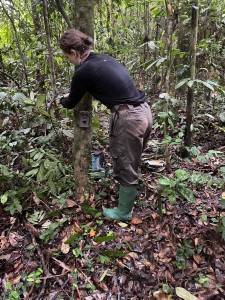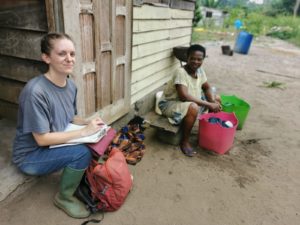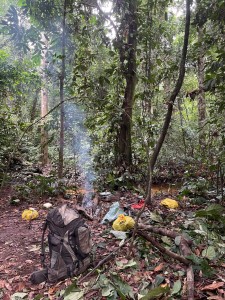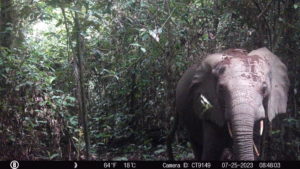Léa Mimeault
MSc Student
Contact Information
Department of Biology
Concordia University (Loyola Campus)
7141 Sherbrooke St. W. H4B 1R6
Montreal, QC, Canada
Office: SP301.14
Lab: SP434
(514) 848-2424 (ext. 4021)
lea.mimeault@mail.concordia.ca
Education
2023 – Present: MSc in Biology (Animal Ecology and Conservation), Concordia University, Montreal, Canada
2018 – 2021: BSc in Biology (Specialization in Conservation), Laval University, Quebec, Canada
My Project
Impact of habitat loss on elephant habitat use and their interactions with humans around the Campo-Ma’an National Park, southern Cameroon
Background
The 2019 declassification of 60,000 hectares of forest for their conversion into an agro-industrial plantation brings a new threat to the critically endangered forest elephant Loxodonta cyclotis around the Campo-Ma’an National Park (CMNP). As the creation of plantations can create attractive feeding spots for elephants, as well as lead them towards the nearby human village fields, such a major change in landscape is bound to exacerbate the human-elephant conflict by generating a new elephant distribution. Combining the local ecological knowledge and camera trap surveys, the research aims to better understand elephant habitat use in response to habitat loss to develop appropriate mitigation measures and enable better human-elephant coexistence around the CMNP.
Field Work
The field work part of this research took place in May-October 2023 in the Campo-Ma’an Technical Operational Unit in the southwestern region of Cameroon. 21 remote camera traps were deployed, and reconnaissance walks were conducted between camera trap stations. Household interviews were conducted in different nearby villages for indirect evidence and local attitudes towards elephants and conservation.



Objectives
The study aims to:
-
Chapter 1:
- Assess the influence of human activity on forest elephant habitat use;
- Compare results between two different monitoring methods.
Chapter 2:
- Examine the current human-elephant dynamics through local communities’ attitudes and experiences;
- Report on solutions to attenuate the current human-elephant conflict and promote ecosystem-based management of the Campo-Ma’an area.
Publications
Mimeault, L. and Weladji, R. B. (2024). Forest elephants in a human-dominated landscape: are they risk-takers? Society for the Study of Animal Behaviour. 12-13 December, 2024, Edinburgh, Scotland, United Kingdom (Poster Presentation).
Mimeault, L. and Weladji, R. B. (2024). Les éléphants de forêt dans un habitat dominé par l’humain : sont-ils des preneurs de risques? Société Québécoise d’Étude Biologique du Comportement. 15-17 November, 2024, Montréal, Québec, Canada (Oral Presentation).
Mimeault, L. and Weladji, R.B. (2024). Impact of habitat loss on human-elephant conflict in southern Cameroon. Centre de la science de la biodiversité du Québec. 19-21 February, 2024, Montréal, Québec, Canada (Poster Presentation).
Mimeault, L. and Weladji, R.B. (2023). Impact of habitat loss on forest elephant and their interactions with humans in southern Cameroon. Société Québécoise d’Étude Biologique du Comportement. 3-5 November, 2023, Montréal, Québec, Canada (Oral Presentation).
Asselin, A., Mimeault, L., Côté, M. and Déry, F. (2021). Protocol for the quantification of fur damage in moose caused by winter ticks, Chapter of a doctoral thesis, Laval University, Quebec, Canada.
Mimeault, L. and Fortin, D. (2021). Spatiotemporal variation in foraging behavior of free-ranging plains bison (Bison bison bison), Undergraduate Honours Thesis, Laval University, Quebec, Canada.
